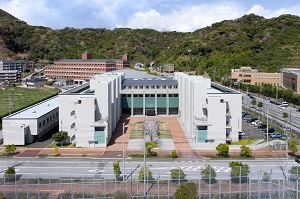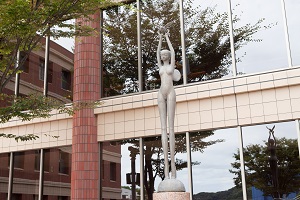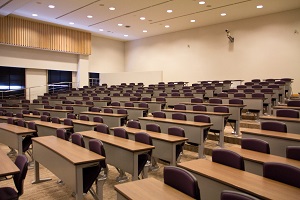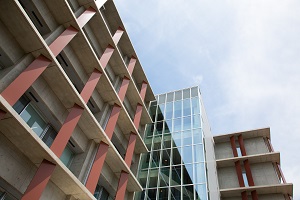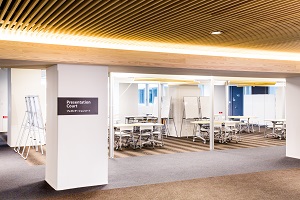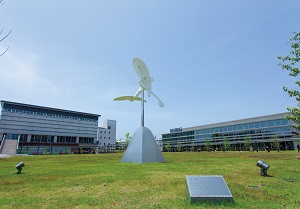本文
Faculty of Cultural Studies
Department of Cultural Studies / Enrollment capacity:150 (with 30 slots for Evening Coures Students) / Eikokuji Campus
With its recent expansion, the Faculty of Cultural Studies now gives students more opportunities than ever to encounter and connect with a wide array of academic disciplines—from literature and languages to the fields of regional studies, tourism, and law.
This ongoing growth has also fueled substantial increases in the Faculty’s yearly capacity of enrolled students, who have commenced their studies at the new Eikokuji Campus—an environment that the University has envisioned as a thriving “center of knowledge.”
By offering an Evening Course and holding entrance examinations for non-traditional students, the Faculty is also opening the doors of learning wider than ever before.
In the Faculty of Cultural Studies, students engage constantly with the written word to probe concepts at deeper levels, develop critical thinking skills, and enjoy a wide variety of opportunities to apply their learning in the real world.
Through a curriculum that combines intellectual rigor with practical application, students approach culture from different angles in acquiring the brand of knowledge and scholarship that the age of globalization demands.
Our graduates
Can independently deepen their understanding of people and the world around them
Cultivate the sense of communality and morality integral to being a member of society
Develop the ability to accept and sustain the world’s diverse mix of cultures and humanity’s universal wisdom from an understanding, sensitive perspective
Gain an international mindset for thriving in the age of globalization
Can make valuable, future-oriented contributions toward creating a rich, convivial society
Day and Evening Courses in 10 Areas of 3 Disciplines
Wide Range of Courses in the Humanities and Social Sciences
The Faculty of Cultural Studies offers courses in “language and culture” and “creation of regional culture,” which are typically held during the day, and courses in “general culture,” which are typically held in the evening. With each new school year, daytime students select language and culture courses or creation of regional culture courses, and study in their major area. At the same time, students take courses in peripheral areas in addition to their major area, in an aim to acquire a broad range of knowledge.
Students who take courses mainly in the evening select general culture courses from the time they enroll, and study in that area.
Credits that apply in both can be earned between the two daytime categories and the one evening category, up to a set number of credits.
Unique classes
End-to-end small-group education
The unique aspect of classes in the Faculty of Cultural Studies is the implementation of small-group education. The Faculty has created an environment in which students and instructors, and students and other students, learn together proactively in close proximity, with a focus on practice.
Emphasis on fieldwork
Our emphasis is on going out into the field while also reading and thinking. Going back and forth between the Eikokuji Campus and the field deepens learning further.
Overview of each area
English philology area/International culture area
Students develop the thinking ability to view cultures relatively and the linguistic ability to explain their own culture and other cultures, through acquisition of advanced English language skills, the ability to think globally, and the ability to put ideas into action.
Regional culture area/Regional development area
Students go out in the field for practical learning focused on abundant, sustainable regional development, and develop the ability to engage in regional development.
Contemporary legal culture area/Daily living and legal culture area
Students develop the ability to contribute to the formation, maintenance, and development of culture by exploring the various problems of contemporary society and civic life from the perspectives of law and culture.
Japanese philology area/Japanese literature area
Students awaken to their own standpoint in the context of contemporary society and develop the sensitivity and ability to more firmly establish their own identity, through a study of Japanese language and literature.
Tourism culture area/Tourism urban development area
Students develop the ability to identify and solve problems while interacting proactively with society, by going into the field and engaging in a specialized study of tourism culture and tourism urban development from an on-site perspective.
Study programs
Japanese Studies in a Global Perspective Program
As globalization moves rapidly forward, the ability to explain Japan’s history and culture in a foreign language is becoming increasingly required. This program utilizes lectures in English that approach Japanese culture from a variety of perspectives. It is a study program that aims to increase dramatically students’ ability to express the characteristics of Japanese culture in English.
Japanese Language Teacher Development Program
This study program is for people who aim to become teachers of the Japanese language to foreigners. Students can take basic courses related to Japanese language education. Students increase their ability to educate as Japanese language teachers by rethinking Japanese from the perspectives of learning theory, teaching theory, teaching materials theory, and teaching practice.
Licenses and qualifications that can be acquired
Junior High School First Class, Japanese Language High School First Class, Japanese Language
Junior High School First Class, English Language High School First Class, English Language
Career vision
Faculty of Cultural Studies post-graduation track
Graduates of the Faculty of Cultural Studies have contributed to society in a broad range of fields, including civil service, private business, education, mass media, and publishing. Some have even utilized their language skills to play an active role on the international stage. We anticipate that our graduates will utilize their learning in areas related to communities, tourism, and law in the future to be active in private business, civil service, and NPOs that support regional development and tourism urban development, as well as in tourism, travel, lodging, and economic organizations.

